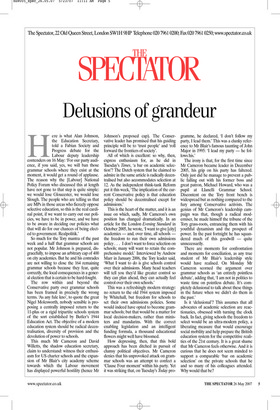Delusions of grandeur
Here is what Alan Johnson, the Education Secretary, told a Fabian Society and Progress debate for the Labour deputy leadership contenders on 16 May: ‘For our party audience, if you said, yes, we will ban those grammar schools where they exist at the moment, it would get a round of applause. The reason why the [Labour] National Policy Forum who discussed this at length have not gone to that step is quite simple: we would lose Gloucester, we would lose Slough. The people who are telling us that are MPs in those areas who fiercely oppose selective education, so this is the real cardinal point, if we want to carry out our policies, we have to be in power, and we have to be aware in deciding our policies what that will do for our chances of being elected to government. Realpolitik.’ So much for the Tory mantra of the past week and a half that grammar schools are not popular. Mr Johnson is prepared, disgracefully, to impose an arbitrary cap of 400 on city academies. But he and his comrades are not willing to close the 164 remaining grammar schools because they fear, quite correctly, the local consequences in a general election that is certain to be hard-fought.
The row within and beyond the Conservative party over grammar schools has been framed in precisely the wrong terms. ‘As any fule kno’, to quote the great Nigel Molesworth, nobody sensible is proposing a centrally imposed return to the 11-plus or a rigid tripartite schools system of the sort established by Butler’s 1944 Education Act. The objective of a modern education system should be radical decentralisation, diversity of provision and the devolution of power to schools.
This much Mr Cameron and David Willetts, the shadow education secretary, claim to understand: witness their enthusiasm for US charter schools and the expansion of Mr Blair’s city academy scheme towards which the Labour movement has displayed powerful hostility (hence Mr Johnson’s proposed cap). The Conservative leader has promised that his guiding principle will be to ‘trust people’ and ‘roll forward the frontiers of society’.
All of which is excellent: so why, then, express enthusiasm for, as he did in Tuesday’s Times, ‘a bar on academic selection’? The Dutch system that he claimed to admire in the same article is radically decentralised but also accommodates selection at 12. As the independent think-tank Reform put it this week, ‘The implication of the current Conservative policy is that education policy should be decentralised except for admissions.’ This is the heart of the matter, and it is an issue on which, sadly, Mr Cameron’s own position has changed dramatically. In an article for the London Evening Standard in October 2005, he wrote, ‘I want to give [city] academies — and, over time, all schools the freedom to run their own admissions policy ... I don’t want to force selection on schools; many will want to retain the comprehensive model.’ Interviewed by Andrew Marr in January 2006, the Tory leader said, ‘What I want to do is give schools control over their admissions. Many head teachers will tell you they’d like greater control so they can plan ahead, they can actually feel control over their own schools.’ This was a refreshingly modern strategy: no return to the old 1944 system imposed by Whitehall, but freedom for schools to set their own admissions policies. Some would indeed have opted to become grammar schools; but that would be a matter for local decision-makers, rather than ministers and mandarins. With the correct enabling legislation and an intelligent funding formula, a thousand educational flowers might well have bloomed.
How depressing, then, that this bold approach has been ditched in pursuit of clumsy political objectives. Mr Cameron denies that his unprovoked attack on grammar schools was an attempt to confect a ‘Clause Four moment’ within his party. Yet it was striking that, on Tuesday’s Today pro gramme, he declared, ‘I don’t follow my party, I lead them.’ This was a clunky reference to Mr Blair’s famous taunting of John Major in 1995: ‘I lead my party — he follows his.’ The irony is that, for the first time since Mr Cameron became leader in December 2005, his grip on his party has faltered. Only just did he manage to prevent a public falling out with his former boss and great patron, Michael Howard, who was a pupil at Llanelli Grammar School. Discontent on the Tory front bench is widespread but as nothing compared to the fury among Conservative activists. The genius of Mr Cameron’s leadership campaign was that, though a radical moderniser, he made himself the tribune of the Tory grass-roots, entrancing them with his youthful dynamism and the prospect of power. In the past fortnight he has squandered much of this goodwill — quite unnecessarily.
There are moments for confrontation and moments for conciliation, as any true student of Mr Blair’s leadership style would have realised. On Monday Mr Cameron scorned the argument over grammar schools as ‘an entirely pointless debate’, adding that, ‘I am not in politics to waste time on pointless debate. It’s completely delusional to talk about these things in the future when we didn’t do them in the past.’ Is it ‘delusional’? This assumes that all advocates of academic selection are reactionaries, obsessed with turning the clock back. In fact, giving schools the freedom to select would be an ultra-modern policy, a liberating measure that would encourage social mobility and help prepare the British education system for the competitive realities of the 21st century. It is a great shame that Mr Cameron feels otherwise. And it is curious that he does not seem minded to support a comparable ‘bar on academic selection’ on the private schools that he and so many of his colleagues attended. Why would that be?


















































































 Previous page
Previous page